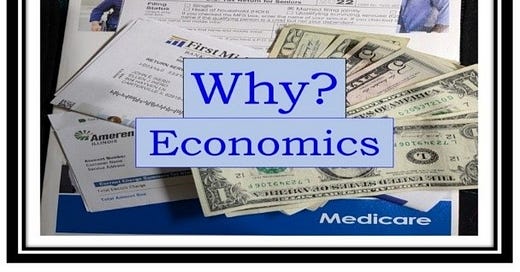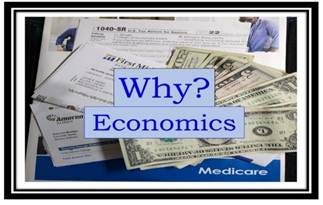The Trump administration seems committed to relying on tariffs to help offset budget shortfalls resulting from promised cuts in federal income taxes. Opponents claim that tariffs are equivalent to sales taxes which disproportionately affect those who spend the money they earn because they can’t afford to save or invest it. Restoring previous cuts in income taxes, including capital gains taxes, would be a more equitable way to deal with budget shortfalls. But, raising income taxes would require action by Congress, or in this case, inactions since tax cuts during the previous Trump administration are set to expire. The President can impose tariffs instead, allowing Congress to avoid being blamed for raising taxes. He seems more than willing to do so.
U.S. producers whose products compete with cheaper imports will be the primary beneficiaries of tariffs. However, retaliatory tariffs by other nations, which seem inevitable, will hurt U.S. producers who rely on export markets. The effectiveness of tariffs in reducing the federal budget shortfall will depend on the size of the tariffs and the retaliation of targeted nations. Regardless, politicians will likely use tariff revenues to rationalize continuing and further cuts in income taxes. The primary beneficiaries of tariffs will be the same as those who have benefitted from lower income tax rates since the 1980s: those who can afford to save and invest most of their money rather than spend it. Why not tariffs? Tariffs are simply another way to continue U.S. tax policies of the past 50 years: tax lower-income consumers to help pay for tax cuts that benefit investors and speculators.
The across-the-board tariff threats against Canada and Mexico apparently were about politics rather than economic policy. The threatened 25% tariffs on all goods imported from the two countries are on hold and seem unlikely to be imposed. It’s too early to tell whether the 10% tariff on all Chinese imports is politics or policy. However, President Trump’s announcement of 25% tariffs on steel and 10% on aluminum to all nations, including allies and adversaries, is a major change in U.S. economic policy. Trump has threatened to impose reciprocal tariffs on all countries that impose import duties on U.S. goods. He said he is currently considering tariffs on cars, semiconductors and pharmaceuticals. When asked about the threats of retaliation by other countries against the new tariffs, he responded: "I don't mind." He apparently believes the U.S. can win any trade war his tariffs might start.
There was a lot of debate about tariffs during the presidential campaign. Trump told audiences “A tariff is a tax on a foreign country. A lot of people like to say it’s a tax on us. No, […] it’s a tax that doesn’t affect our country.” In a previous post, I mistakenly agreed that the tariffs or import taxes would be paid by those who export to the U.S. This is incorrect. Tariffs are paid by the domestic importers, not foreign exporters. The economic implications are the same, but the new tariffs are taxes on imports that will be paid by U.S. businesses, not by foreigners who export to the U.S.
So, who stands to benefit and pay the costs of this new round of tariffs and likely trade wars? Most importers are manufacturers or wholesalers, like automakers or wine merchants, who will increase their selling prices enough to offset the tariffs or import taxes they pay to the U.S. government. These higher prices will ultimately be passed on to consumers. Consumers will respond to the higher prices by buying less, resulting in reduced quantities of imported goods. Reduced imports will allow U.S. producers of similar products to charge higher prices, providing economic incentives to increase domestic production to offset the decline in imports. Prices will also rise for goods that are substitutes for imports, such as plastics for steel and aluminum or California wine for French wine. Consumer prices for U.S.-produced products will increase until domestic prices reestablish their previous relationship with higher-priced imports. Prices for both imported and similar domestic products will rise enough to offset the cost of tariffs.
Sales taxes and tariffs are both ultimately paid by consumers. Sellers are required to add sales taxes to the prices they charge to consumers. Sellers do not benefit economically from collecting sales taxes from their customers. Tariffs are reflected in higher retail prices for imported products rather than taxes added to retail prices. Importers who pay the tariffs don’t benefit economically from raising their prices enough to cover the costs of tariffs. However, the U.S. producers of products essentially the same or similar to the targeted imports benefit from higher prices but don’t pay the government anything. They receive the benefits of tariffs without bearing any of the costs.
Whenever the U.S. places tariffs on imports, the exporting countries typically retaliate by placing tariffs on products imported from the U.S. This increases the cost of U.S. exports to foreign buyers because they are forced to pay tariffs to their governments. Foreign importers raise their prices to cover the cost of tariffs, which reduces their sales of their imported products. This reduces U.S. exports of products targeted by foreign tariffs. For example, during the first Trump administration, U.S. farmers were paid $28 billion by U.S. taxpayers to compensate them for the loss of agricultural exports caused by the tariff-induced trade war with China. There is no way to accurately assess how much a new trade might cost U.S. exporters or what portion of those costs U.S. taxpayers might be forced to absorb.
There is room for disagreement on how much tariffs will cost U.S. consumers in terms of higher retail prices. There is also room for disagreement concerning how much the resulting trade wars will cost U.S. exporters and taxpayers. However, there is no doubt that U.S. corporations facing competition from imports, directly or indirectly, will receive most of the direct benefits. However, the primary beneficiaries will be those who continue to benefit from lower income tax rates rationalized politically as offset by tariffs paid by other nations. There is also little doubt that U.S. consumers will pay most, if not all, of the costs.
There is a legitimate place for tariffs in overall economic policy. Total elimination of tariffs would leave nations with no means of protecting their economic sovereignty, which is essential for authentic free trade. Economic sovereignty means nations are free to choose how much of their needs they meet through domestic production and how much they meet by relying on imports from other countries.
For example, nations that rely on food purchased in world markets to meet their basic needs have no economic sovereignty. They may not be able to buy enough food to meet their needs during times of global scarcity. Tariffs on agricultural imports, in addition to subsidies, are a legitimate means of keeping agricultural prices high enough to incentivize farmers to produce enough to meet their nation’s basic food needs. Countries whose farmers can't grow enough food to ensure domestic food security need long-term agreements with other countries that are not contingent on prices in world markets.
No nation, not even the United States, would benefit from tariffs high enough to allow domestic producers to meet all of the nation’s needs. Every nation has comparative advantages in producing some things and comparative disadvantages in others. For example, the U.S. has comparative advantages relative to Canada and Mexico in some things, and Canada and Mexico have comparative advantages in others. That’s why the U.S. historically has negotiated long-term trade agreements with Mexico and Canada. These agreements have included tariffs negotiated to protect the economic sovereignty of each nation. People disagree about whether the specifics of these agreements have been good or bad for different sectors of the three economies. However, there has never been serious disagreement regarding whether trade among the three nations has benefitted all three.
Every nation needs dependable trading partners, even for some things important to their domestic economies. Economic sovereignty is about being free to choose, but the choice need not be self-sufficiency. Long-term trade agreements negotiated with dependable trading partners are logical means of achieving economic sovereignty. Arbitrarily imposed tariffs, in violation of trade agreements or without the consent of exporting nations, threaten economic sovereignty, by destroying trust in essential economic relationships. The U.S. economy will be weakened, not strengthened, by arbitrarily imposed tariffs on Canada, Mexico, the European Union, and others with whom the U.S. has had stable long-term trade relationships.
One way or another, the people of the United States will pay the costs of using tariffs to help offset the budget shortfalls resulting from lower income tax. Imports are good when nations need foreign competition to motivate economic efficiency. Tariffs are good when nations need to restrict imports to protect economic sovereignty. However, tariffs used for intimidation, retaliation, isolation, a show of strength, or to avoid the appearance of raising taxes may be politically expedient but are economically indefensible. Why not tariffs? That’s why.
John Ikerd
https://www.cnn.com/.../donald-trump-tariffs/index.html
https://www.theguardian.com/.../trump-tariffs-price-hikes...





